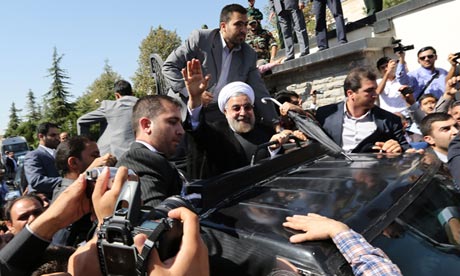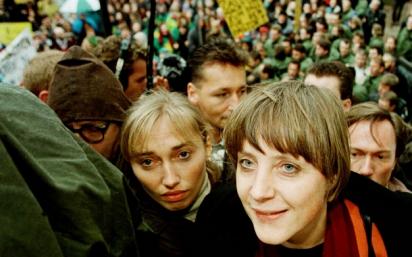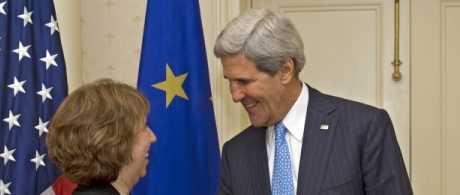Την Δευτέρα το πρωί, όταν η Γερμανία ξύπνησε για να διαπιστώσει ότι η Άνγκελα Μέρκελ είχε επανεκλεγεί καγκελάριος της Γερμανίας, η εφημερίδα Der Tagesspiegel δημοσίευσε το ακόλουθο σχόλιο στο πρωτοσέλιδό της: «Τι χρειαζόμαστε τα κόμματα αφού έχουμε την Μέρκελ; Αυτή είναι το δέλεαρ. Η μανούλα είναι η καλύτερη. Εμείς γνωρίζουμε τους εαυτούς μας. Εκείνη δεν θα αλλάξει πολύ και δεν χρειάζεται να το κάνει. Ακριβώς επειδή η Μέρκελ είναι τόσο λίγο θεαματική, τόσο διστακτική, πρόδηλα αναποφάσιστη, είναι τόσο πολύ κοντά στον τρόπο που πραγματικά είναι και οι ίδιοι οι Γερμανοί. Οι Γερμανοί εκλέγουν την δική τους εικόνα».
Η Άνγκελα Μέρκελ ως υπουργός Περιβάλλοντος, το 1997. (Courtesy Reuters)
Η παράγραφος εξηγεί το ουσιαστικό μυστήριο τής Μέρκελ ως πολιτικού. Το 2007 η βιογραφία της από τον Gerd Langguth, έγραφε ότι «υπάρχει κάτι σε αυτήν που θυμίζει την σφίγγα... Κανείς δεν έπρεπε να δει πίσω από το προστατευτικό κέλυφος που η ίδια έχει κατασκευάσει γύρω από τον εαυτό της.» Αποκρούει τις προσωπικές ερωτήσεις με ένα αυτοσαρκαστικό ανέκδοτο: Όταν ένας δημοσιογράφος πρόσφατα την ρώτησε πώς κατάφερε να φαίνεται τόσο φρέσκα παρά την εξαντλητική προεκλογική εκστρατεία, του απάντησε, «Ξοδεύοντας μια περιουσία στη γερμανική βιομηχανία καλλυντικών». Αποφεύγει επίσης την παραμικρή νύξη χαρισματικής ρητορείας. Η νικητήρια ομιλία της ήταν χαρακτηριστικά χαμηλών τόνων. Αρνήθηκε να πει το οτιδήποτε για πιθανές συμμαχίες ή μελλοντικά σχέδια. Η πιο συγκεκριμένη οδηγία της προς τους υποστηρικτές της ήταν, απλά, να γιορτάσουν. Δεν ήταν σαφές το βράδυ των εκλογών αν θα προτιμούσε να κρατήσει για τον εαυτό της τα πολιτικά σχέδιά της για τα επόμενα τέσσερα χρόνια ή αν απλά δεν είχε πολιτικά σχέδια να μοιραστεί. Πάντα έτσι ήταν με τη Μέρκελ - όχι ότι οι Γερμανοί φαίνεται να νοιάζονται.








